12 Best Email Apps for Android in 2025 (Privacy Focused)

Your inbox is a digital extension of your life, holding everything from personal conversations to critical financial data. Choosing the right email client for your Android device is no longer just about convenience; it's a critical security decision. The default app on your phone might be convenient, but does it truly protect your privacy or offer the robust features needed for professional or secure communication? This guide moves beyond standard feature lists to evaluate the best email apps for Android through the crucial lenses of privacy, security architecture, and compatibility with secure hosted email platforms.
We understand the problem: sifting through countless options on the Google Play Store is overwhelming. Many users, from privacy-conscious individuals to small business owners, are seeking alternatives to ad-supported services that mine personal data. They need clients that support end-to-end encryption, custom domains, and transparent data handling policies. This resource is designed to solve that problem by providing a direct, comprehensive comparison.
Inside, you will find a curated list of top-tier Android email apps. Each entry offers a detailed analysis, focusing on:
- Privacy and Security: We examine encryption protocols (like PGP and end-to-end), tracker blocking, and data storage policies.
- Hosted Platform Integration: We assess how well each app works with secure services like Proton Mail versus standard accounts like Gmail or Outlook.
- Real-World Usability: We provide insights into the user interface, customization options, and specific features that enhance productivity for different needs.
Every review includes screenshots for a visual reference and direct links to the Google Play Store, so you can easily download and test the app that best fits your requirements. Our goal is to help you select an application that acts as a fortress for your digital identity, not just a simple mailbox.
1. Google Play Store
The Google Play Store isn't an email app itself, but it’s the most critical starting point in your search for the best email apps for Android. As the official marketplace, it provides a centralized and secure environment to find, evaluate, and install a vast array of email clients, from mainstream options to privacy-focused newcomers. Its role is so foundational that even security-centric services like Proton Mail recommend it as the safest default installation source for their applications.
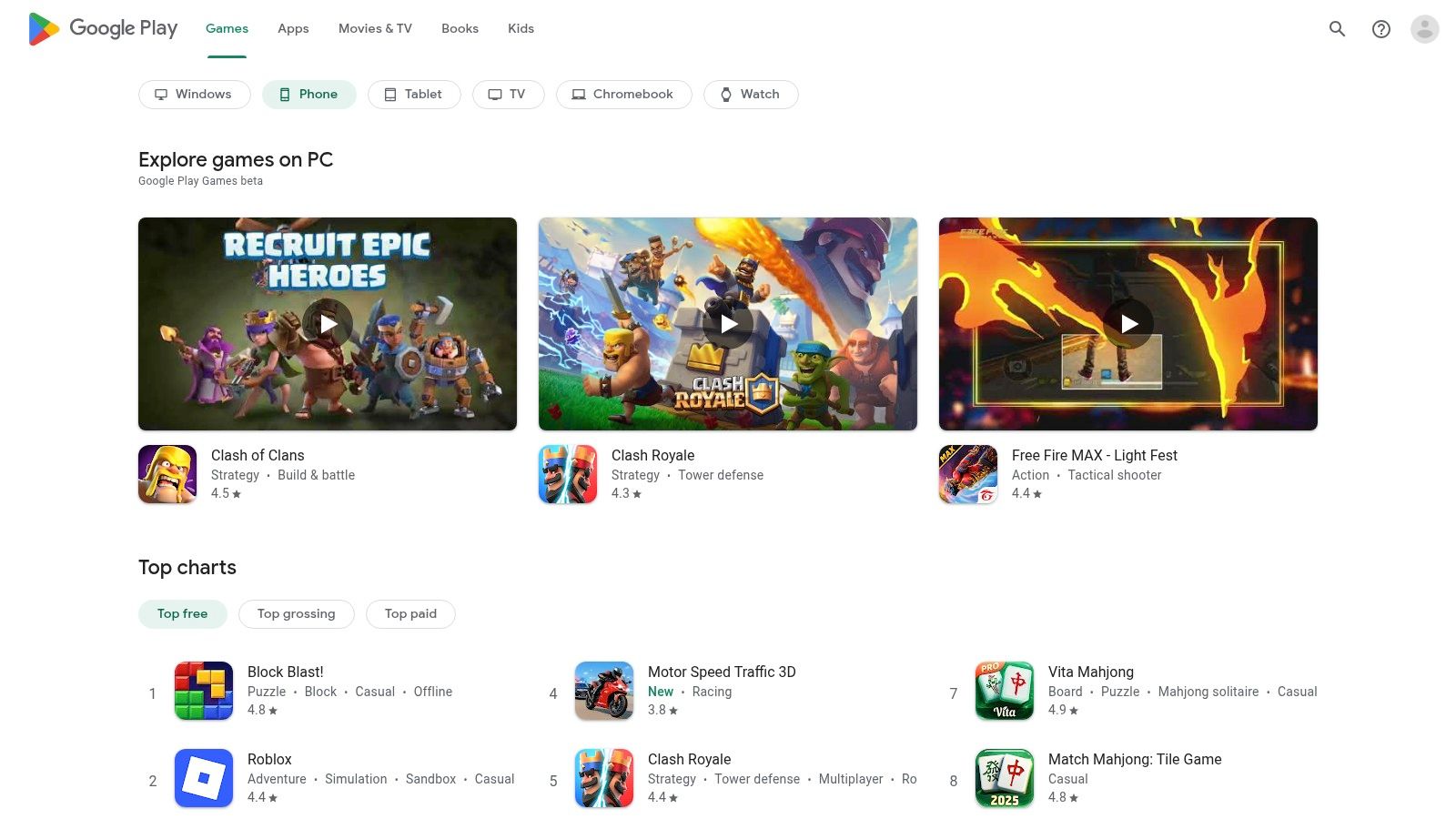
The platform’s key strength lies in its security and user verification features. Every app is scanned by Google Play Protect, a built-in malware defense system that checks for harmful behavior. This adds a crucial layer of security, reducing the risk of downloading a compromised or malicious email client that could steal your data. Additionally, the user review and rating system offers invaluable social proof, allowing you to gauge an app’s reliability and user experience based on feedback from a global community.
Key Features & Considerations
- Security & Verification: Google Play Protect scanning and verified developer badges help ensure the legitimacy and safety of email apps, which is paramount when handling sensitive communications.
- Centralized Management: It simplifies app discovery, one-tap installation, and automatic updates, ensuring you always have the latest security patches and features for your chosen email client.
- User Feedback: The transparent rating and review system is a powerful tool for comparing different email apps, offering real-world insights into performance, bugs, and privacy practices.
While alternative app stores and direct APK downloads exist, they require significant caution and technical know-how to vet safely. For most users, especially those prioritizing security and ease of use, the Google Play Store remains the gold standard for accessing the entire catalog of Android email apps.
Website: https://play.google.com
2. Gmail (by Google)
As the default email client on most Android devices, Gmail is the benchmark against which many others are measured. Its deep integration with the Android ecosystem and Google Workspace makes it an incredibly powerful and convenient tool for both personal and professional use. However, its primary business model is built on data collection, which presents a significant privacy trade-off. While it offers robust security features like advanced spam filtering and phishing protection, it does not provide end-to-end encryption by default.
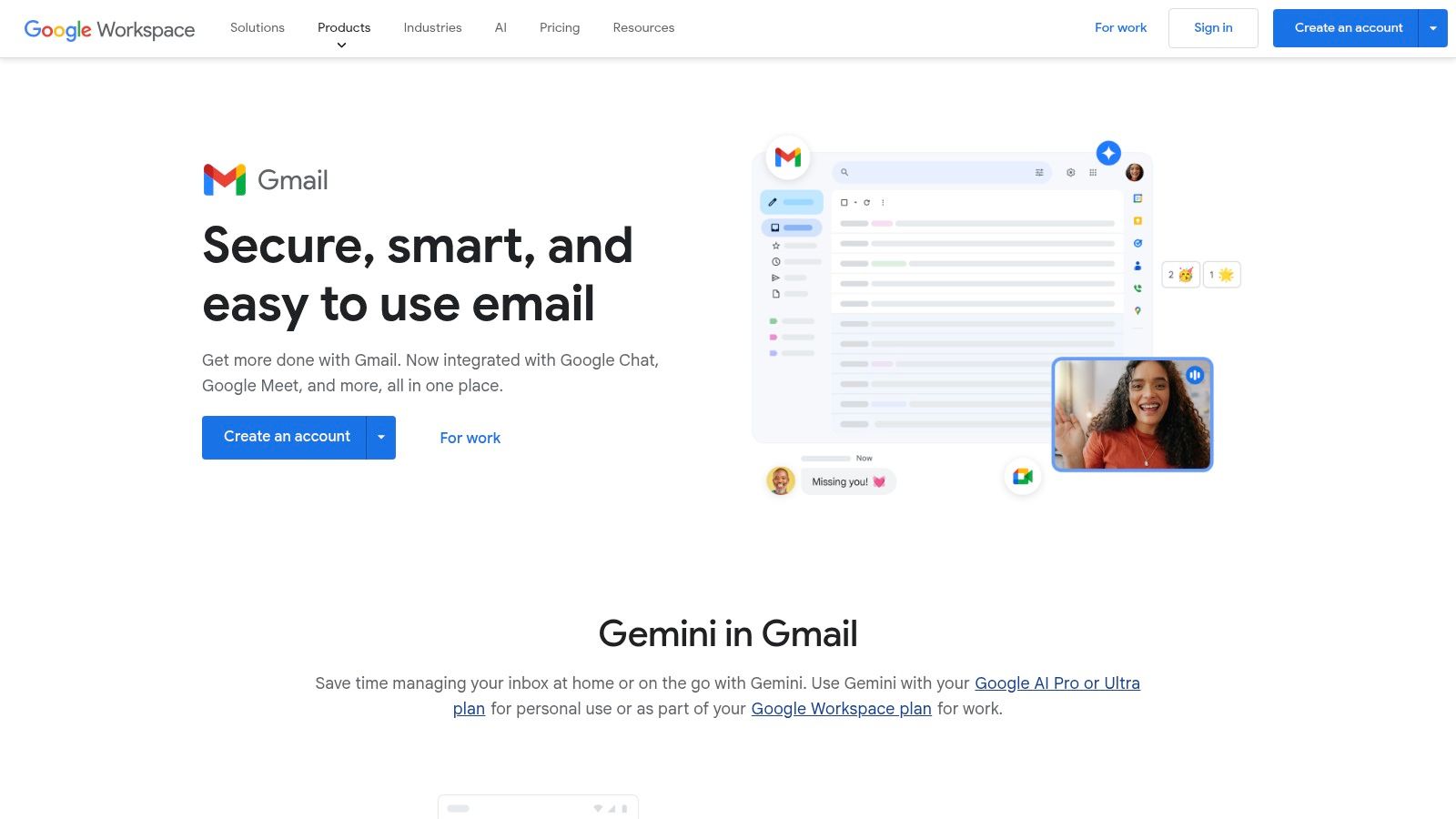
Gmail’s key advantage lies in its seamless connection to other Google services like Calendar, Drive, and Meet, creating a unified productivity hub. Its spam filtering is widely regarded as one of the best, effectively keeping junk mail out of sight. The app is constantly evolving, with Google rolling out AI-powered features like Smart Reply and, more recently, Gemini integrations for subscribers. Beyond standard email functions, some apps offer extended communication capabilities; for example, you can learn more about sending SMS directly from your Gmail or Outlook app through various integrations and services.
Key Features & Considerations
- Powerful Search & Organization: Utilizes Google's search technology for fast, accurate results and uses a flexible label system instead of traditional folders for better organization.
- Integrated Google Ecosystem: Seamlessly works with Google Calendar, Drive, and Meet, allowing you to manage attachments, schedule meetings, and collaborate directly from your inbox.
- Intelligent Spam Filtering: Employs advanced machine learning to identify and block spam, phishing attempts, and malware with high accuracy, enhancing your email security.
While Gmail offers a feature-rich experience for free, its data-centric model raises valid privacy concerns for many users. The platform's business model relies on user data, which may conflict with the needs of those seeking maximum privacy and no-tracking solutions. For those prioritizing data privacy, exploring some of the best email alternatives to Gmail for privacy might be a worthwhile consideration.
Website: https://www.google.com/gmail/about/
3. Microsoft Outlook Mobile
Microsoft Outlook has evolved far beyond its desktop roots, establishing itself as a powerhouse among the best email apps for Android, especially for users embedded in the Microsoft ecosystem. It offers a polished and highly integrated experience, combining email, calendar, and contacts into a single, cohesive application. Its core strength lies in its seamless synchronization with Microsoft 365 and Exchange accounts, providing enterprise-grade security and management features that are critical for business environments.
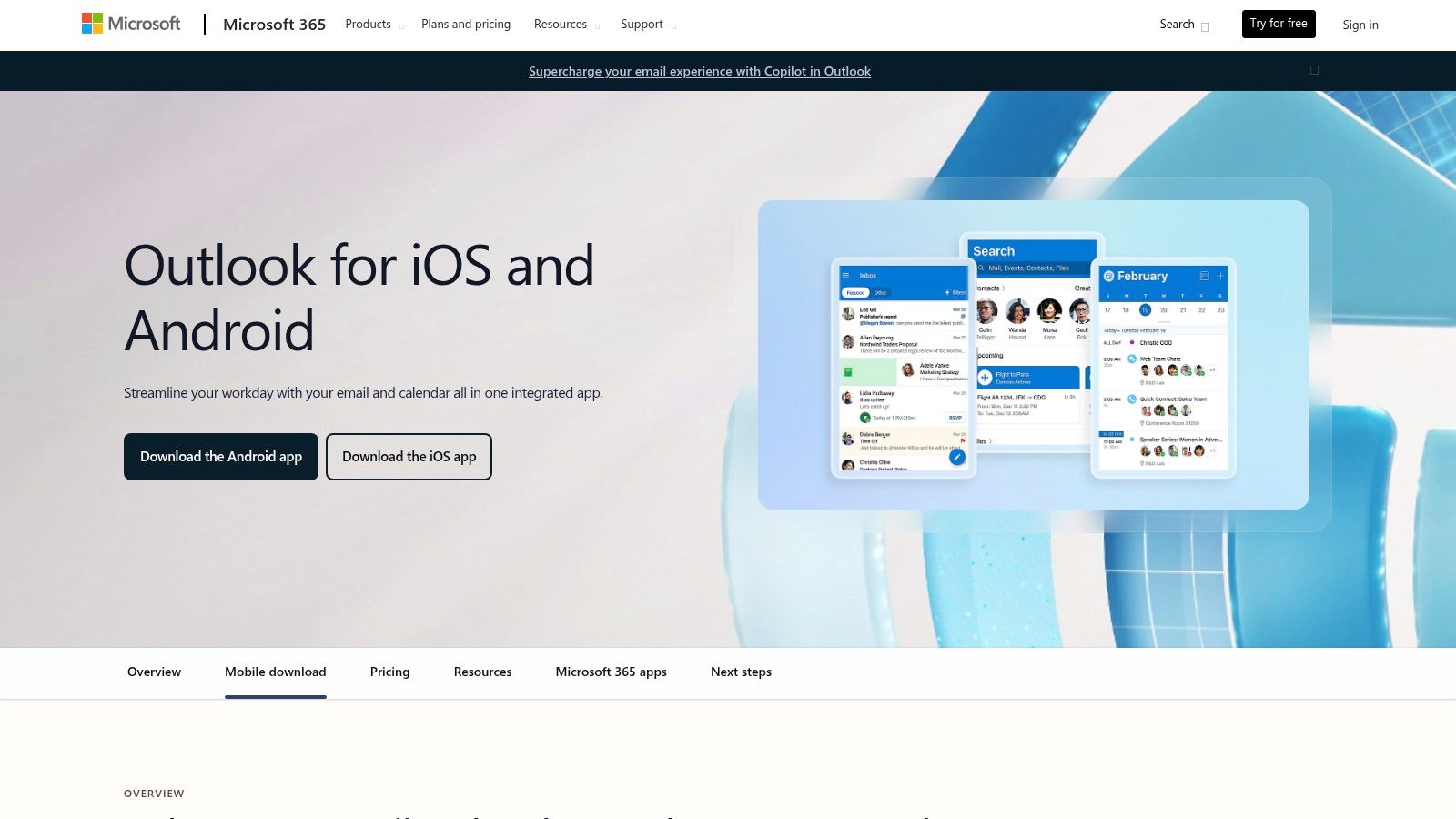
From a security perspective, Outlook Mobile offers robust protection within the Microsoft 365 framework, including support for data loss prevention (DLP) policies and sensitivity labels. This makes it a strong choice for corporate environments where compliance is key. However, like Gmail, it is not a zero-knowledge service; Microsoft has access to email data stored on its servers. The app's signature "Focused Inbox" intelligently sorts your important messages, but this requires server-side processing of your communications.
Key Features & Considerations
- Focused Inbox & Unified View: Intelligently prioritizes important emails and allows you to manage multiple accounts (including Gmail and Yahoo) from one central location.
- Integrated Calendar & Scheduling: Offers robust scheduling capabilities, allowing you to share availability and manage appointments directly within the app, streamlining workflow significantly.
- Enterprise-Grade Security: Supports Microsoft 365 security policies, data loss prevention (DLP), and sensitivity labels, making it a secure choice for business and professional use.
- Microsoft 365 Integration: Provides deep integration with other Microsoft services like OneDrive, Teams, and the upcoming Copilot AI assistant for enhanced productivity.
While Outlook excels for business and Microsoft 365 users, privacy-conscious individuals may be wary of its data collection practices. It is an excellent client for managing a hosted Exchange or Microsoft 365 account but is less suited for those seeking true end-to-end encrypted communication.
Website: https://www.microsoft.com/microsoft-365/outlook-mobile-for-android-and-ios
4. Proton Mail
Proton Mail stands as a benchmark for privacy-first communication, making it one of the best email apps for Android for users prioritizing security. Developed by scientists who met at CERN, its core mission is to provide an encrypted, secure, and user-respecting email service. Unlike mainstream providers that may scan emails for advertising data, Proton Mail uses zero-access, end-to-end encryption, ensuring that no one, not even Proton Mail itself, can read your messages.
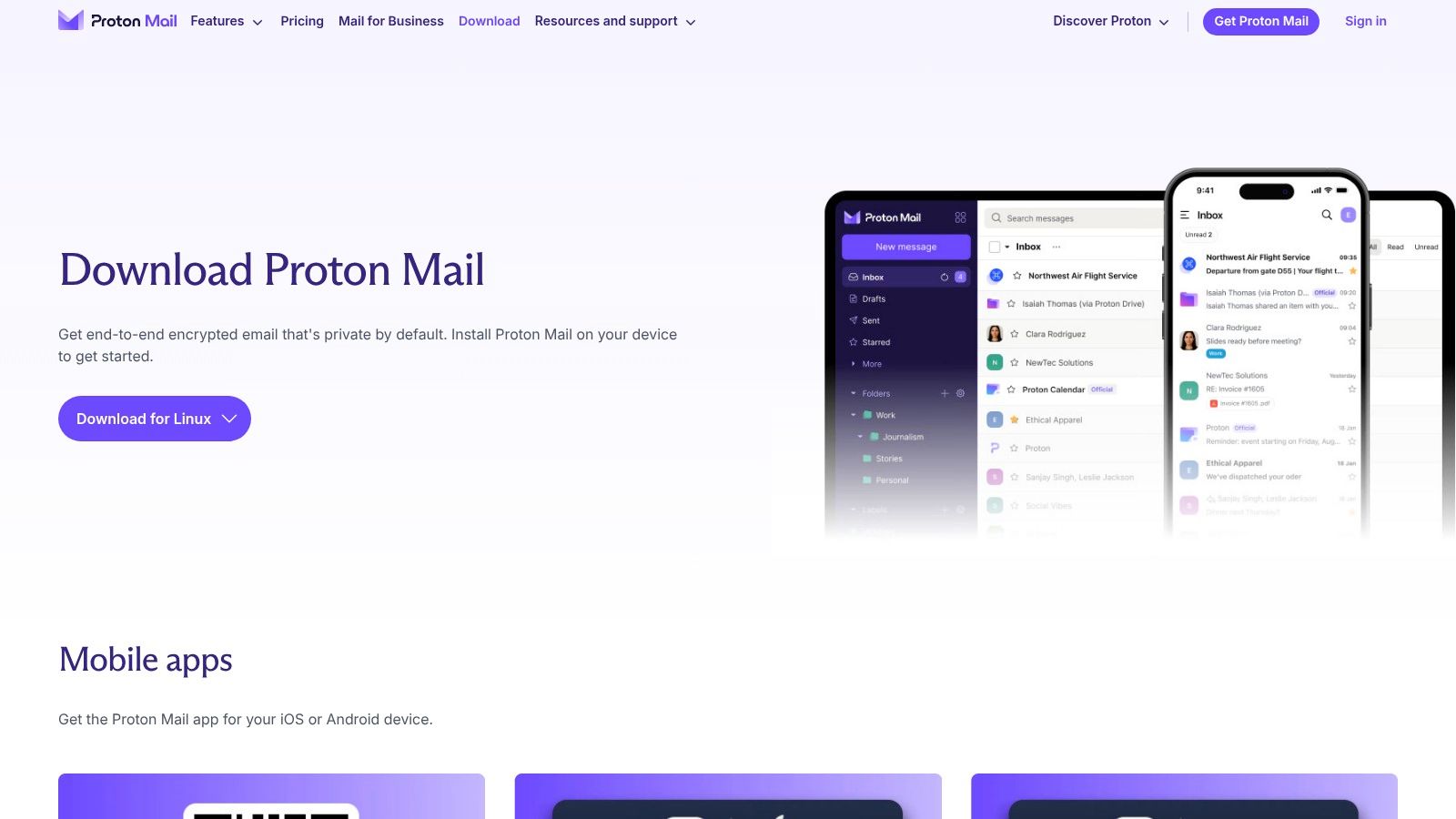
The platform’s commitment to security extends beyond encryption. The Android app supports biometric locks (fingerprint or face unlock) for an added layer of physical security. It also offers self-destructing emails and password-protected messages that can be sent to non-Proton users, making it a versatile tool for confidential communication. For users who want to avoid the Google ecosystem entirely, Proton Mail provides a direct APK download from its website, granting full access without relying on the Play Store.
Key Features & Considerations
- End-to-End Encryption: All emails between Proton users are automatically encrypted, and messages to external services can be encrypted with a password, providing robust privacy protection.
- Open-Source & Audited: The apps are open-source and regularly audited by independent security experts, offering transparency and verifiable security claims. For a detailed comparison with other privacy-focused services, see this in-depth analysis of email privacy solutions.
- Swiss Privacy Laws: Based in Switzerland, all user data is protected by strict Swiss privacy laws, which are among the strongest in the world.
While its encryption model prevents integration with third-party email clients like Thunderbird or Outlook, its dedicated app provides a clean, modern, and highly secure user experience. The free plan is generous, though paid tiers unlock more storage, custom domains, and additional features for power users and businesses.
Website: https://proton.me/mail
5. Spark Mail
Spark Mail is a powerful, cross-platform email client designed for individuals and teams seeking to supercharge their productivity. It moves beyond a traditional inbox by integrating intelligent features that help you focus on what's important, making it a strong contender for one of the best email apps for Android. Its "Smart Inbox" automatically sorts incoming mail into categories like Personal, Notifications, and Newsletters, allowing you to quickly process low-priority items and concentrate on crucial conversations.
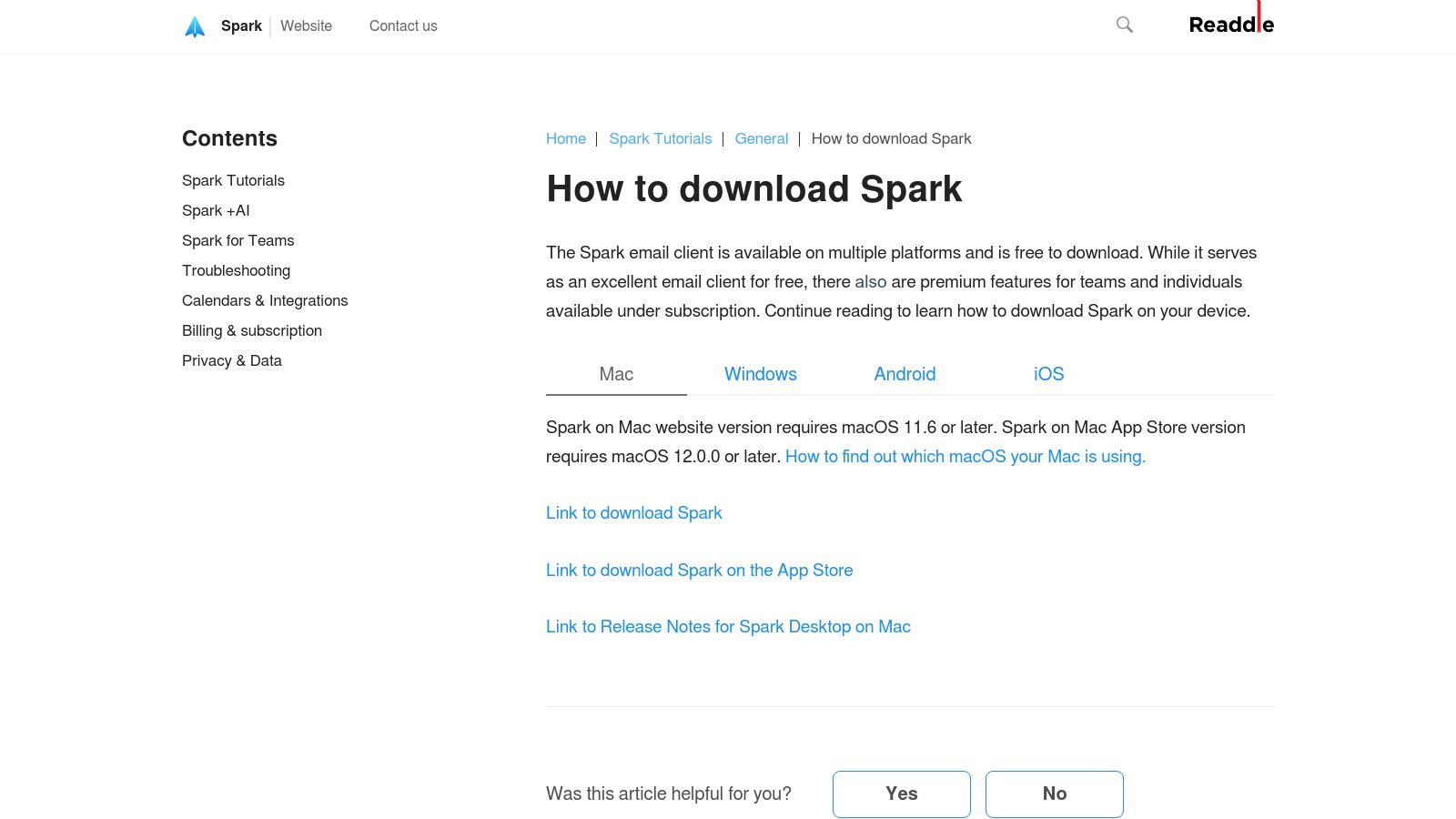
From a privacy standpoint, it's important to understand how Spark achieves its advanced features. Features like the Smart Inbox and cloud-based notifications require processing your email data on Spark's servers. While the company has a clear privacy policy, this model introduces a third party into your communication chain. For users handling highly sensitive information or those who want to avoid server-side processing entirely, this could be a significant drawback. However, for those prioritizing productivity features, Spark provides a very polished experience.
Key Features & Considerations
- Smart Inbox & Productivity Tools: Features like Snooze, Send Later, and Reminders help you take control of your inbox and manage your time more effectively. The intelligent sorting is a key highlight.
- Team Collaboration: Unique tools allow you to create, share, and discuss emails with colleagues. You can also work on email drafts together in real-time, enhancing team efficiency.
- Cross-Platform Sync: With native apps for Android, iOS, macOS, and Windows, Spark ensures a consistent and synchronized experience across all your devices.
While Spark offers a polished and feature-rich experience, some users have reported intermittent sync or notification delays. The privacy trade-off for its smart features is a critical consideration for security-focused users.
Website: https://sparkmailapp.com/help/general/how-to-download-spark
6. BlueMail
BlueMail is an independent and feature-rich client that positions itself as a universal solution for managing multiple email accounts in one place. It supports virtually any provider, including Gmail, Outlook, Exchange ActiveSync, and standard IMAP/POP3 accounts, making it one of the most versatile options for users who don't want to be locked into a single ecosystem. Its strength lies in its blend of powerful organizational tools and a highly customizable user interface.
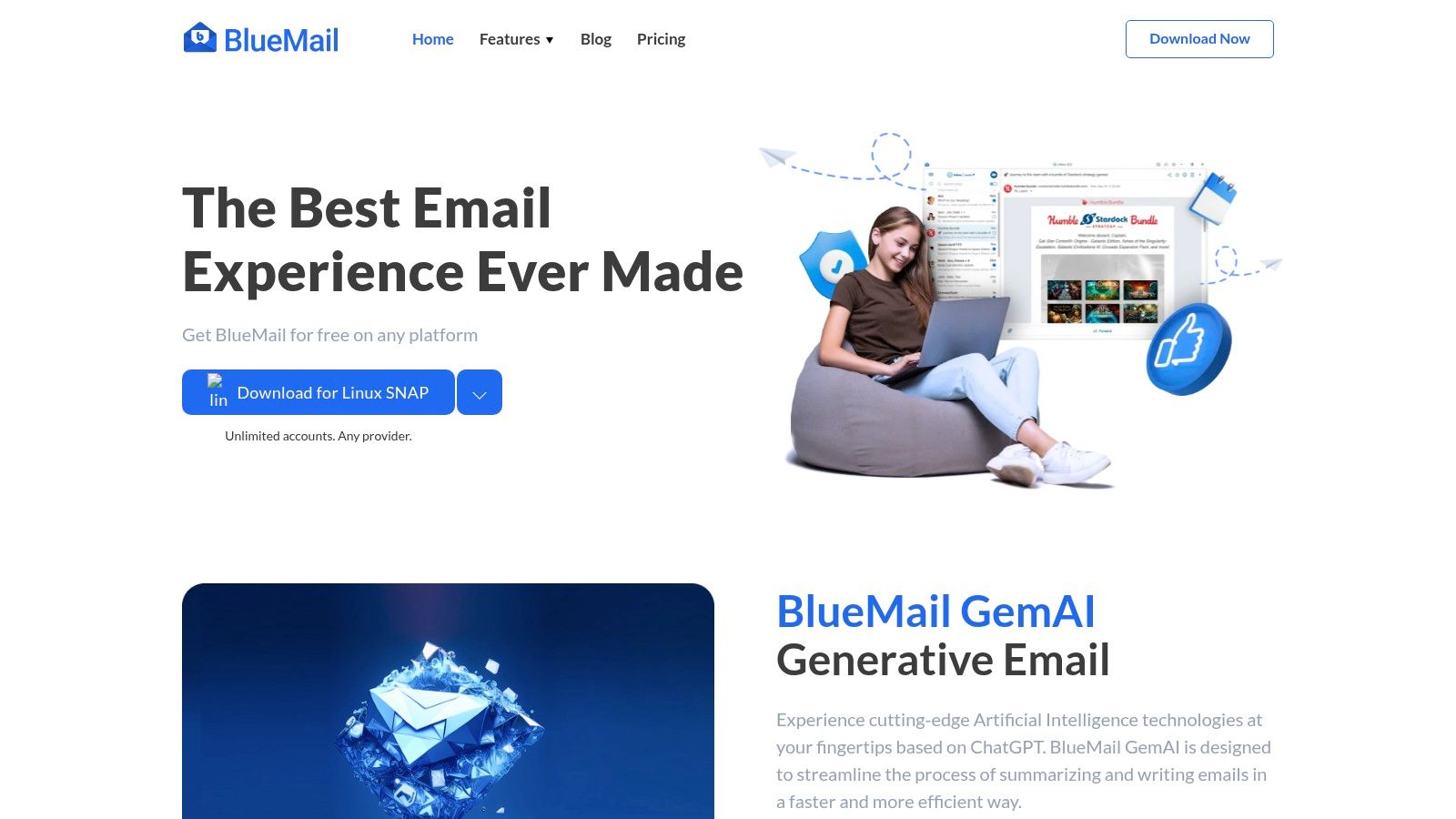
Similar to Spark, BlueMail's advanced features, such as its AI-powered writing assistant GemAI, rely on processing data on its own servers. This is a crucial point for privacy advocates. The convenience of AI-assisted composition comes at the cost of sharing email content with a third-party service. While the company states it uses secure protocols, this architecture differs fundamentally from clients that communicate directly with your email provider without an intermediary.
Key Features & Considerations
- Unified Inbox & Integrated Calendar: Manage all your emails and events from various providers in a single, cohesive interface, simplifying workflow and reducing the need to switch between apps.
- AI-Assisted Writing (GemAI): Utilizes AI to help draft professional emails, summarize long threads, and suggest replies, significantly speeding up email management tasks.
- Extensive Customization: Offers granular control over notifications, swipe actions, themes, and overall appearance, allowing you to tailor the experience to your exact preferences.
- Cross-Platform Sync: With desktop versions available for Windows, macOS, and Linux, your settings, accounts, and preferences are synced seamlessly across all your devices.
While the core app is free and actively developed, users prioritizing absolute privacy should carefully review BlueMail's privacy policy and consider the implications of its server-side processing model.
Website: https://bluemail.me
7. Aqua Mail
Aqua Mail has long been a favorite among Android power users, earning its reputation as a highly versatile and customizable email client. It stands out for its extensive protocol support, catering not just to standard IMAP and POP3 accounts but also to corporate environments using Exchange via EWS. This flexibility makes it one of the best email apps for Android for users who need to consolidate multiple, diverse email accounts into a single, highly configurable interface.
 ensures it works with virtually any email provider, from personal Gmail to corporate servers.
- Advanced Customization: Users can fine-tune notifications, create custom aliases and identities, and configure per-account settings, offering a level of control few other apps can match.
- S/MIME Encryption (Pro): The paid version provides enterprise-grade security through S/MIME support, allowing users to sign and encrypt emails for enhanced privacy and authenticity.
- Flexible Pricing: Aqua Mail offers both a one-time purchase for a lifetime license and a subscription model for its Pro features, giving users a choice in how they pay for advanced functionality.
While the most powerful security features are locked behind the Pro version, Aqua Mail's free tier is still incredibly capable. It's the ideal client for users who feel constrained by mainstream apps and want granular control over their entire email workflow.
Website: https://www.aqua-mail.com
8. Nine – Email & Calendar
Nine is an email application built from the ground up for business professionals and enterprise users who rely heavily on Microsoft Exchange ActiveSync. While many email clients offer Exchange support as an add-on, Nine makes it the core focus, delivering a robust and reliable experience that closely mimics a desktop client's power. It stands out by connecting directly to your company's servers, ensuring no data is stored on third-party cloud infrastructure, a critical consideration for security and privacy.
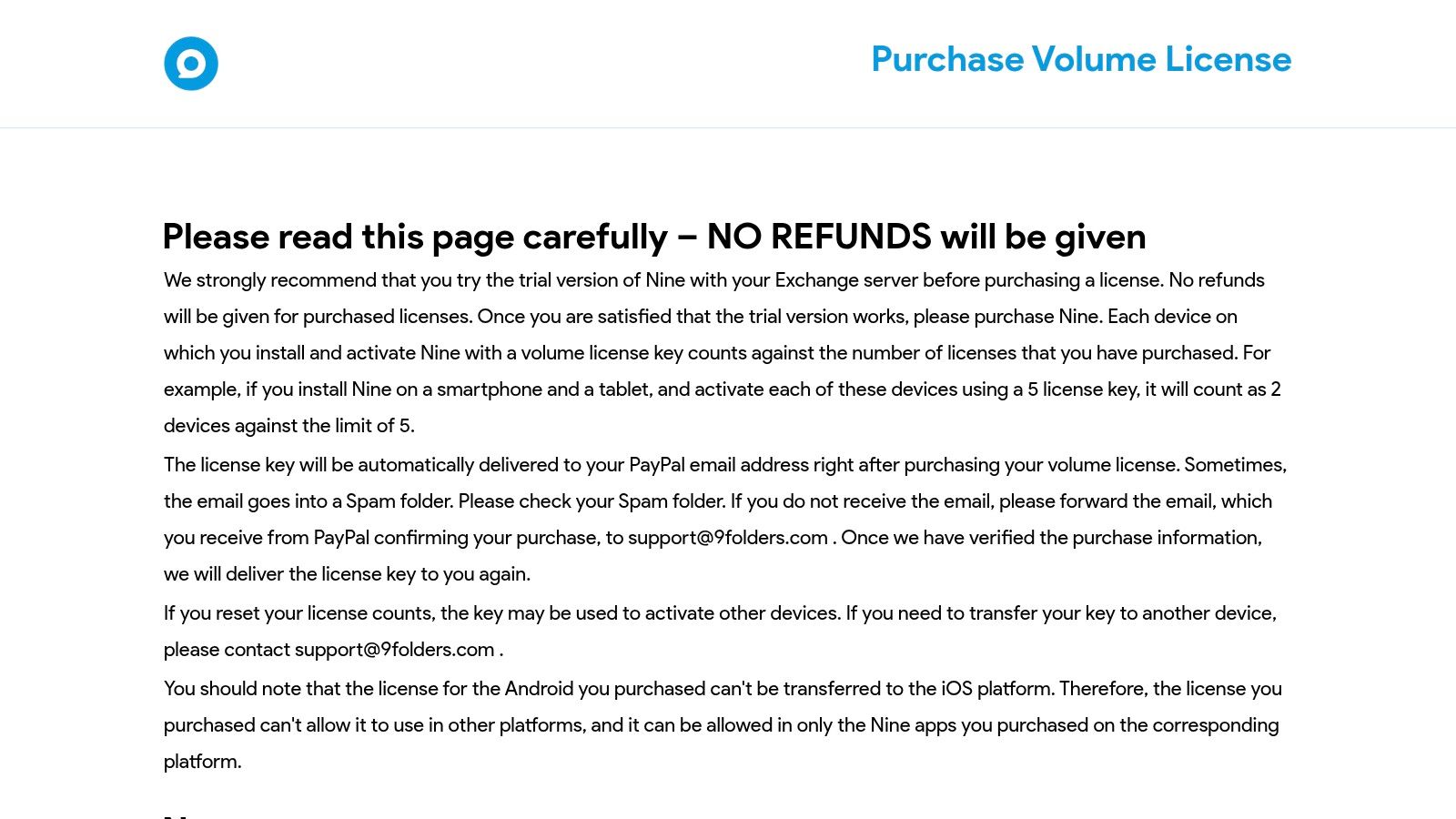
This direct-sync architecture is Nine’s key security advantage. By not using an intermediary server, it minimizes the attack surface and ensures that your credentials and email data are only transmitted between your device and your own email server. The app is renowned for its comprehensive integration of email, calendar, tasks, notes, and contacts, all synchronized seamlessly. This business-centric approach makes it one of the best email apps for Android for users in a corporate environment.
Key Features & Considerations
- Direct Push Synchronization: Connects directly with Exchange Server, Office 365, and other ActiveSync-compatible services without passing data through a third-party server, maximizing privacy and security.
- Integrated Productivity Suite: Seamlessly manages emails, calendars, tasks, and contacts within a single, unified interface, including features like Global Address List (GAL) support.
- Rich User Experience: Offers a modern interface with features like a conversation mode, rich-text editor, and extensive customization options to tailor the app to specific workflows.
- One-Time Purchase Model: After a generous trial period, the app is available for a single lifetime payment, avoiding the recurring costs typical of many premium email clients.
While Nine excels with Microsoft accounts, users should test its compatibility with their specific setups during the trial, especially for complex enterprise environments or those needing advanced Gmail OAuth integration.
Website: https://www.9folders.com/purchase-license-key/
9. TypeApp
TypeApp is a highly capable and visually clean email client that excels at simplifying the management of multiple email accounts. It strikes a balance between powerful features and an intuitive user interface, making it one of the best email apps for Android for users who need a unified inbox without a steep learning curve. Its design philosophy centers on bringing all your communications from providers like Gmail, Outlook, and Yahoo into a single, cohesive stream.
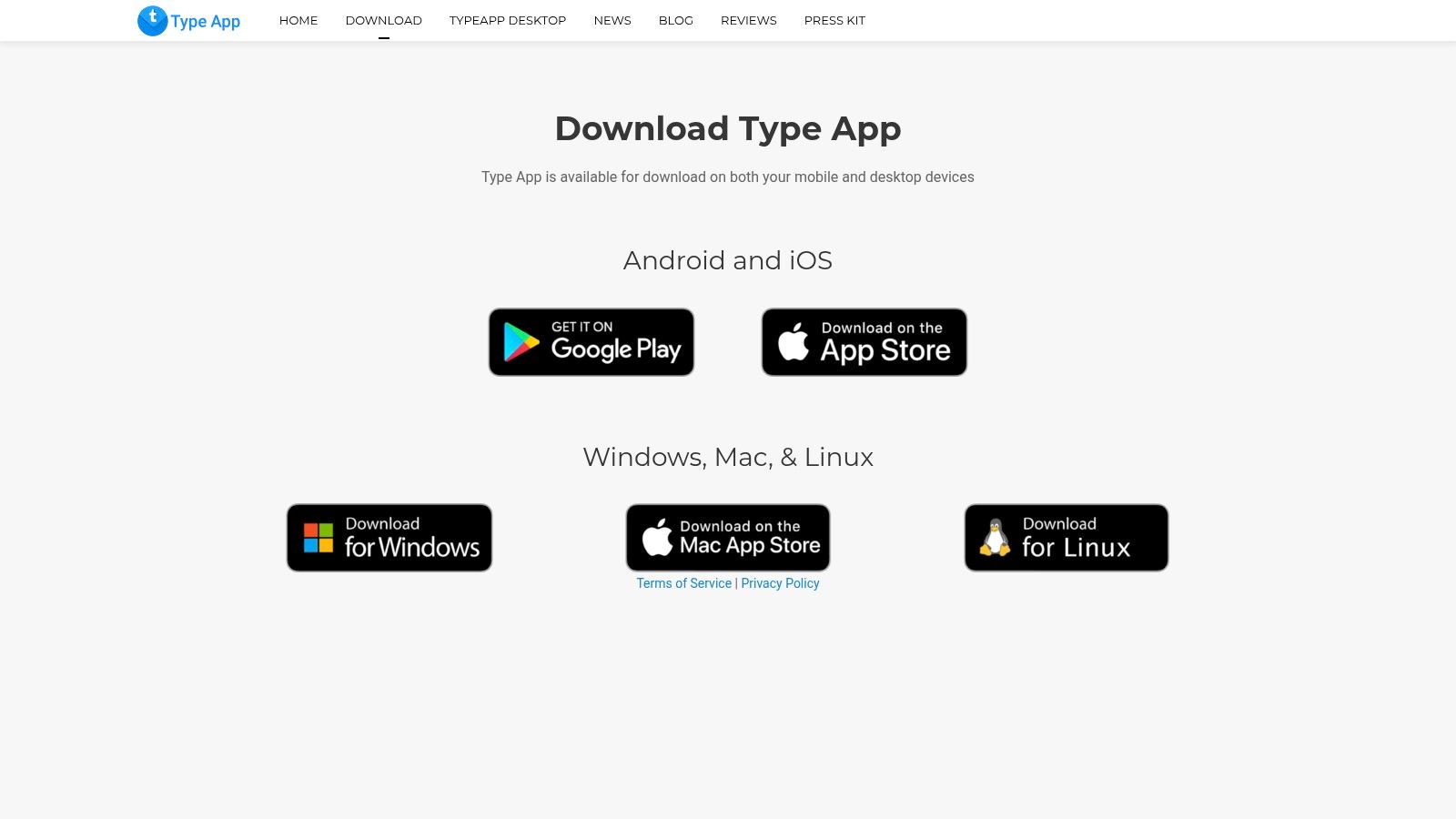
The app’s main draw is its seamless setup and robust multi-account support. Users can add accounts from virtually any provider and manage them from a unified or separate view. In terms of security, TypeApp uses OAuth 2.0 for providers like Gmail and Outlook, which is a secure authentication standard. However, like several other feature-rich clients, it may use proxy servers to manage notifications and other features, which is a point of consideration for users who prefer a direct client-to-server connection.
Key Features & Considerations
- Unified Inbox & Multi-Account Support: Effortlessly consolidates emails from all your accounts (IMAP, POP3, Exchange) into one manageable inbox, streamlining your workflow.
- Customization: Offers various themes, including a dark mode, and allows for highly specific notification settings for different accounts, contacts, or groups.
- Cross-Platform Sync: With desktop clients for Windows, macOS, and Linux, TypeApp provides a consistent experience across all your devices, keeping your emails in sync.
While TypeApp is excellent for personal and small-scale use, it may lack some advanced enterprise-level security features found in dedicated business clients. For more tips on this, learn how to manage multiple email accounts effortlessly.
Website: https://typeapp.com/download/
10. Yahoo Mail
Yahoo Mail has evolved significantly from its early days, now offering a modern Android app packed with organizational features that make it a contender among the best email apps for Android. While not primarily known for privacy, it distinguishes itself with user-friendly tools designed to declutter your inbox and streamline daily tasks. It’s a solid choice for users looking for a free, high-storage option with powerful filtering and management capabilities.
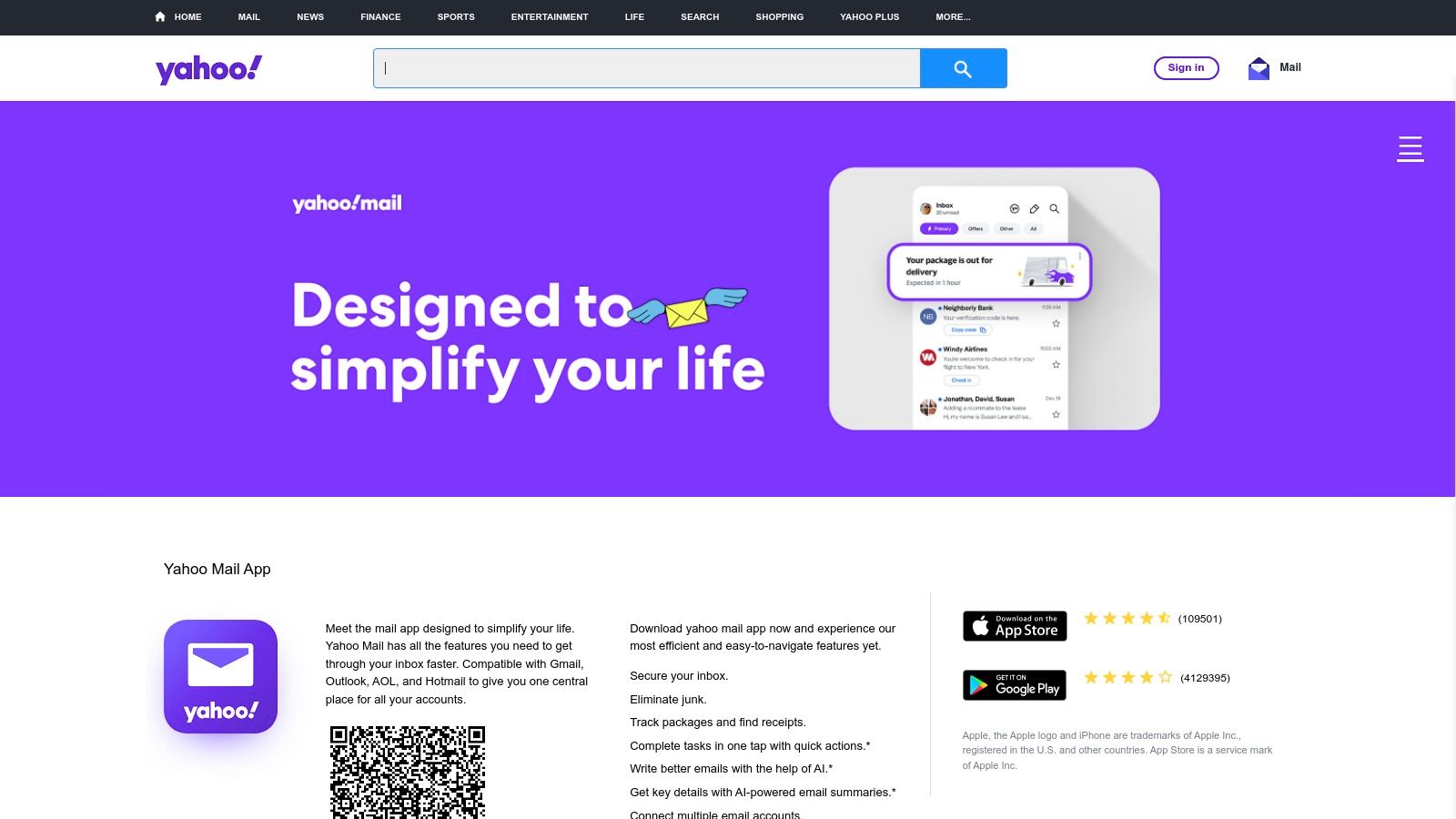
From a privacy perspective, Yahoo Mail operates on an ad-supported model, similar to the free version of Gmail. This means your data is analyzed to serve targeted advertisements. For users seeking to minimize data collection, this is a significant drawback. However, the app excels at cutting through inbox noise. Its one-tap unsubscribe tool makes it incredibly easy to remove yourself from marketing lists, and dedicated "Views" for attachments and receipts automatically sort important information.
Key Features & Considerations
- Organizational Tools: Features like one-tap unsubscribe, dedicated views for package tracking, and smart inbox filters help you manage a high volume of emails efficiently.
- Large Storage Availability: Yahoo Mail typically offers a very generous amount of free storage, reducing the need to constantly delete emails to save space.
- Ad-Free Option: Users can subscribe to Yahoo Mail Plus to remove ads from their inbox, providing a cleaner and more focused experience. It also works with non-Yahoo accounts, allowing you to centralize your communications.
While the app is feature-rich, some users have reported occasional login and synchronization issues. For those prioritizing a straightforward, free email app with excellent organizational features over stringent privacy protocols, Yahoo Mail remains a compelling option.
Website: https://mobile.yahoo.com/mail
11. myMail
myMail carves out its space in the crowded market of best email apps for Android by focusing on speed, simplicity, and accessibility. It's an excellent choice for users who need a lightweight client that can quickly consolidate multiple accounts from major providers like Gmail, Yahoo, and Outlook into a single, clean interface. The app prioritizes a straightforward user experience over a complex feature set, making it ideal for those overwhelmed by more intricate power-user applications.
The primary appeal of myMail is its ease of use. Setting up new accounts is nearly instantaneous, and navigating the unified inbox feels fluid and responsive. For security, it uses standard SSL/TLS encryption for data in transit, which is the industry norm. However, like many multi-service clients, it may route authentication or notifications through its own servers. This is an important consideration for users who prefer apps that establish a direct, unmediated connection to their email provider's server.
Key Features & Considerations
- Multi-Account Consolidation: Effortlessly manages emails from Gmail, Outlook, Yahoo Mail, iCloud, and any IMAP or POP3-enabled account in one unified inbox.
- Real-Time Notifications: Customizable push notifications keep you updated without draining your battery, allowing you to tailor alerts for different accounts or contacts.
- Simplified Interface: The clean, fast, and intuitive user interface makes it easy to read, organize, and respond to emails without a steep learning curve.
- Data Encryption: Secures your email data with SSL and TLS protocols during transit, protecting your information from being intercepted between your device and the mail servers.
myMail is best suited for users who value a no-fuss, reliable email client for managing personal accounts. If you don't require advanced business features or granular privacy controls but want a fast, multi-account solution that just works, myMail is a strong contender.
Website: https://mymail.my.com/
12. Thunderbird for Android
Thunderbird for Android represents a major step forward for open-source mobile email, bringing the respected Thunderbird desktop experience to Android by building on the solid foundation of K-9 Mail. As a community-funded and privacy-first project, it offers a powerful alternative for users who prioritize transparency and control over their data. This app stands out as one of the best email apps for Android for those committed to free and open-source software (FOSS) principles.
The platform’s core strength is its unwavering commitment to privacy and security without commercial interests. Unlike many free apps that monetize user data, Thunderbird is supported by donations, ensuring its development is driven solely by user needs. It supports standard protocols like IMAP and POP3 and integrates seamlessly with OpenKeychain for robust PGP end-to-end encryption, making it a top choice for security professionals and privacy advocates. This makes it an ideal client for use with secure, private hosted email platforms.
Key Features & Considerations
- Open-Source & Community-Driven: Being completely free and open-source means its code is available for public audit, ensuring no hidden trackers or backdoors. Its development is funded by the community, not by advertising or data sales.
- Powerful Encryption Support: Deep integration with OpenKeychain allows for easy PGP-encrypted email, a critical feature for journalists, activists, and anyone handling sensitive information.
- Flexible Distribution: Users can install the app from multiple sources, including the Google Play Store for convenience or F-Droid for a purely open-source ecosystem, giving users ultimate control over their software sources.
While it lacks native Exchange ActiveSync support and its feature updates may not be as rapid as commercially-backed competitors, Thunderbird for Android is an unparalleled choice for power users seeking a secure, private, and customizable email client free from vendor lock-in.
Website: https://thunderbird.planet.mozilla.org/
Top 12 Android Email Apps Feature Comparison
| Email Client | Core Features & Security | User Experience ★★★★☆ | Value & Pricing  |
Target Audience  |
Unique Selling Points  |
|---|---|---|---|---|---|
| Google Play Store | App marketplace, developer verification, Play Protect | Broad catalog, easy app discovery | Free to use | Android users, app seekers | ★ Largest app selection, trusted source Largest app selection, trusted source |
| Gmail (by Google) | Powerful search, spam filtering, AI tools | Fast, reliable, Google Workspace integration | Free / Paid AI upgrades | General users, enterprises |  Gemini AI, seamless Google integration Gemini AI, seamless Google integration |
| Microsoft Outlook Mobile | Unified inbox, calendar, Microsoft 365 security | Strong scheduling, some sync issues | Free with Microsoft 365 | Business/enterprise users |  Enterprise-grade, Copilot integration Enterprise-grade, Copilot integration |
| Proton Mail | End-to-end encryption, biometric lock | Solid privacy, some Google service reliance | Free & Premium plans | Privacy-conscious users |  Direct APK, privacy-first, encryption Direct APK, privacy-first, encryption |
| Spark Mail | Smart inbox, collaboration tools | Polished UI, productivity features | Free with support | Individuals & teams |  Collaboration, cross-platform support Collaboration, cross-platform support |
| BlueMail | Unified inbox, AI-assisted writing | Easy setup, customization | Free core app | Multi-provider users |  AI writing assist, desktop versions AI writing assist, desktop versions |
| Aqua Mail | Broad protocol support, S/MIME (Pro) | Highly customizable | Free + subscription | Power users |  Advanced security, flexible pricing Advanced security, flexible pricing |
| Nine – Email & Calendar | Exchange/ActiveSync push, calendar, certificates | Robust business tools | One-time lifetime license | Enterprise Exchange users |  Lifetime license, Exchange-focused Lifetime license, Exchange-focused |
| TypeApp | Unified inbox, multi-account, desktop apps | Clean UI, easy setup | Free | General multi-account users |  Cross-platform desktop, theming Cross-platform desktop, theming |
| Yahoo Mail | One-tap unsubscribe, package tracking | Easy onboarding, some sync issues | Free + ad-free subscription | General users |  Package tracking, large storage Package tracking, large storage |
| myMail | Unified inbox, real-time notifications | Simple, fast interface | Free | Multi-account users |  Lightweight, quick setup Lightweight, quick setup |
| Thunderbird for Android | IMAP/POP3, PGP encryption via OpenKeychain | Open source, feature-rich | Free | Privacy-focused, power users |  Open source, no vendor lock-in Open source, no vendor lock-in |
Securing Your Communications: Choosing a Client That Aligns With Your Privacy Goals
Navigating the crowded marketplace of email clients can feel overwhelming, but making an informed decision is the first critical step toward reclaiming your digital privacy. Throughout this guide, we've explored a wide spectrum of the best email apps for Android, from the feature-rich ecosystems of Gmail and Microsoft Outlook to the security-hardened fortresses of Proton Mail and Thunderbird. Each application presents a unique trade-off between convenience, integration, and data sovereignty.
The key takeaway is that no single app is universally "best" for everyone. Your ideal choice hinges entirely on your personal or organizational threat model, your workflow requirements, and your fundamental philosophy on data privacy. The right client for a power user deeply embedded in the Google or Microsoft ecosystem will differ significantly from the one chosen by a journalist handling sensitive communications or a small business owner committed to protecting client data.
Bridging the Gap Between Features and Privacy
One of the most significant themes we've uncovered is the growing tension between advanced, AI-driven features and genuine user privacy. Clients like Spark Mail and BlueMail offer powerful tools such as smart inboxes, snoozing, and team collaboration, which undoubtedly boost productivity. However, these features often require the service to process your email data on their servers, introducing a third party into your communications loop.
Conversely, privacy-first champions like Proton Mail offer end-to-end encryption and zero-access architecture, ensuring no one but you and your recipient can read your messages. The trade-off has historically been a more limited feature set, though this gap is rapidly closing. The arrival of Thunderbird on Android, backed by a long-standing commitment to open-source principles, further strengthens the case for privacy-conscious users who demand transparency and control.
Actionable Steps to Secure Your Inbox
Choosing the right app is only half the battle. To truly secure your communications, you must adopt a holistic strategy. Your selection process should be guided by a few core principles.
- Define Your Non-Negotiables: Are you willing to see ads? Is end-to-end encryption mandatory? Do you need to manage multiple accounts from various providers? Answering these questions first will immediately narrow your options.
- Scrutinize the Privacy Policy: Look for clear language on data collection, server-side processing, and whether the provider shares or sells user data. A transparent policy is often a sign of a trustworthy service.
- Evaluate the Security Model: Beyond encryption, consider support for two-factor authentication (2FA), phishing protection, and tracking pixel blockers. To better understand the types of threats your email app needs to defend against, explore some common phishing email examples and see how sophisticated modern attacks have become.
- Consider the Source: The ultimate step in securing your digital communications is to control the entire pipeline, from the server to your screen. Pairing a secure Android client with a private, self-hosted email platform removes your reliance on Big Tech infrastructure. This model ensures your data is never scanned for advertising, analyzed for metadata, or held on servers outside your direct control.
Ultimately, the journey to finding the best email apps for Android is a personal one. We encourage you to test-drive two or three top contenders from our list. Experience their workflows, inspect their settings, and see which one aligns best with your daily needs and long-term privacy goals. By investing this time upfront, you can build a communication system that is not only efficient and powerful but also a true extension of your right to digital privacy.
Ready to take full control of your email? For the ultimate in privacy and data sovereignty, pair your chosen Android client with Typewire. Our private email hosting platform gives you a secure, ad-free, and tracker-free environment on infrastructure you control, ensuring your communications remain truly yours. Learn more about Typewire and secure your digital identity today.
12 Best Email Apps for Android in 2025 (Privacy Focused)
Posted: 2025-10-04
The 12 Best Email Clients for Mac in 2026: A Guide to Privacy and Security
Posted: 2026-02-24
Professional Email Addresses: Your First Line of Defense for Trust and Security
Posted: 2026-02-21
How Do I Block Gmail and Reclaim Your Inbox Privacy
Posted: 2026-02-17
7 Top Canadian Tech Companies Leading in Privacy and Security for 2026
Posted: 2026-02-13
Professional Email Greeting: Master the professional email greeting today
Posted: 2026-02-10
What is Email Phishing: Securing Your Inbox Against Digital Fraud
Posted: 2026-02-06
10 Email Retention Policy Best Practices for Security and Privacy in 2026
Posted: 2026-02-03
Top 12 Secure Alternatives to Gmail for Privacy in 2026
Posted: 2026-01-31